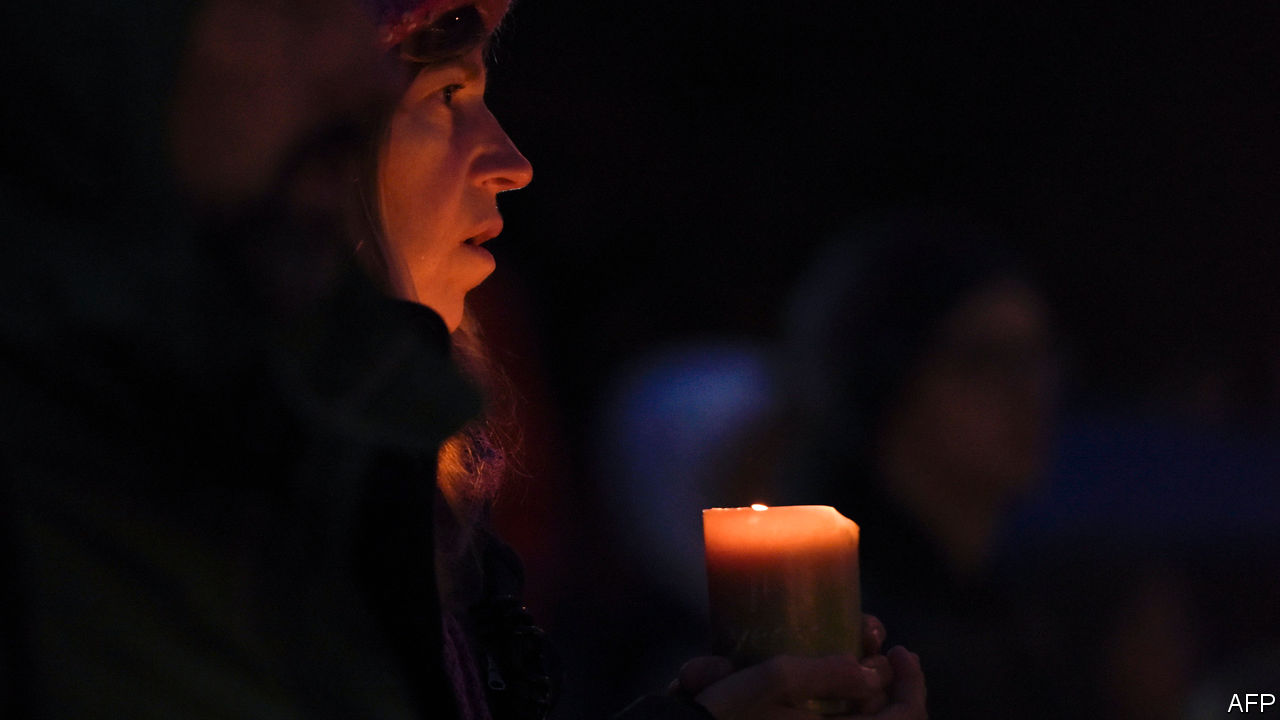
THERE is nothing remarkable about the fact that America will go to the polls next month with mass murder hanging over it. It is a first-world country with a third-world gun-death rate. Nor is it unusual that the killing of 11 people in a synagogue in Pittsburgh on October 27th was instantly politicised. One party to America’s culture wars, the Republicans, stands for the loose guns laws that are the obvious explanation for so much bloodshed. Democrats stand for tightening them. Yet the presidency of Donald Trump has deepened America’s crisis of violence.
That is most obviously because he has helped incite some of it. There is no recent precedent in front-line politics for Mr Trump’s hatefulness. The president has suggested protesters at his rallies should be beaten up. He has praised violent white supremacists. He demeans immigrants as “animals”, his political opponents as traitorous, and journalists as the “enemy of the people”.
Apologists for the president and the angry right he is speaking to point out that the left is not guiltless either. A supporter of Senator Bernie Sanders shot and wounded a Republican congressman, Steve Scalise, last year. But anyone who claims to see equivalence between left and right on this issue is not a commentator on the culture war but a participant in it. The list of 14 people a Trump mega-fan, Cesar Sayoc, mailed pipe-bombs to this month reads like a Who’s Who of the president’s favourite objects of vitriol.
Hillary Clinton, Barack Obama, Representative Maxine Walters (a black congresswoman to whom the president has given the sobriquet “low IQ”), CNN and John Brennan, a former CIA chief, were among them. Hours before Mr Sayoc was apprehended Mr Trump appeared to cast doubt on the existence of his plot. He implied on Twitter that it was a fiction intended to hurt the Republicans in the mid-terms elections. After the arrest, when the would-be bomber was discovered to be an habitué of Mr Trump’s rallies, who lived in a van plastered with Trump slogans, the president furiously denied that there was anything wrong with his rhetoric. “I could really tone it up”, he said.
Robert Bowers, the 46-year-old anti-Semite who is alleged to have shot up the Tree of Life synagogue, was not a Trump supporter. Jews, unlike immigrants and women, have not been subject to attack by Mr Trump. He bears no responsibility for this attack. But his response to it reveals the toll he is taking on American national life. The occupant of the presidency is supposed to provide moral as well as political leadership. His job is to provide reassurance in terms of crisis—as George W. Bush did after the 9/11 attacks, and Ronald Reagan during the cold war. Mr Trump’s response to one of the worst anti-Semitic attacks in America’s modern history shows how incapable he is of this.
His first response to the attack was to try to score political points. “If they had some kind of protection inside the temple maybe it could have been different,” he told reporters. Four policemen were injured in the shooting.
He proceeded to condemn the attack, call for unity, and recommend the death penalty for religious hate crimes such as this. Within hours, on the campaign trail in Indiana and Illinois, he was back to his old self, though, wise-cracking that the only reason he might have considered cancelling his rallies, as some had urged him to, out of respect for the dead, was because his hair had got wet in the rain.
Meanwhile, on Fox News, the cable news channel which supplies Mr Trump with many of his views, a guest pushed a version of the anti-Semitic conspiracy theory—that Jews are running America’s government—which appears to have inflamed Mr Bowers.
Mr Trump did not inspire his abhorrent crime. But he offers no hope that future massacres can be averted. And he represents the starkest rebuke to the necessary fiction that America is sometimes united, especially in grief.








